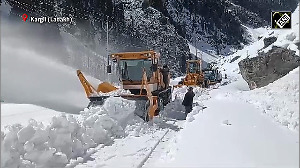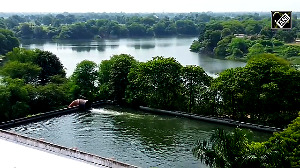The Supreme Court on Friday refused to go into a batch of Public Interest Litigations challenging constitutional validity of the notification on composition of a committee to draft the Jan Lokpal bill, saying the petitions were "premature".
A bench headed by Chief Justice S H Kapadia posted the matter for hearing in July. The bench said, "The petitions are premature and can't be taken as the Lokpal Bill was yet to be passed."
"It is still not the law," the bench, also comprising justices K S Radhakrishnan and Swatanter Kumar said. The bench dealt with the three petitions separately and passed identical orders for hearing them in July.
While dealing with one of the petitions, the bench said, "Some of the averments in the petition are untenable in law." The petitioners including some public-spirited individuals and advocates had challenged the notification issued by the government relating to the constitution of the committee for drafting of the Lokpal Bill.
"We will go strictly by the law," the bench said while adjourning the matter. The PILs have stated that the Lokpal cannot act as a watchdog over the judiciary as it would be unconstitutional.
Among the petitions listed before the bench is one by Mahan Dal, which claims to be a political party in Haryana. It has submitted that a bill of vital national importance cannot be drafted in haste or under pressure from Anna Hazare and others as it would set a bad precedent.
"Whether a decision affecting the whole of the nation can be taken so suddenly without having a public debate on such a national issue of great public importance? "Whether the government could take an action under the threat or pressure from one of the citizens of the country and whether this would not create a bad precedent for future?
"Ultimately, the government succumbed to Hazare's pressure, and hurriedly came out with a resolution on April 8 2011," counsel R K Kapoor had said in the petition.
The PIL alleged that the composition of the joint drafting committee was totally partisan, arbitrary and against national interest. The members of the committee include Union Ministers Pranab Mukherjee, P Chidambaram, M Veerappa Moily, Kapil Sibal and Salman Khursheed.
The civil society representatives are Hazare, Justice (retd) N Santosh Hegde, senior lawyer Shanti Bhushan and his advocate-son Prashant Bhushan and RTI activist Arvind Kejriwal.
"Enactment of Lokpal would be against the spirit of Article 50 of the Constitution of India. It will wipe out the separation of the judiciary from the executive. A decision affecting the whole nation cannot be taken so suddenly without having a public debate on such a national issue of great public importance," the petitioner had said
"The government cannot take action under threat or pressure from one of the citizens of the country and such succumbing to pressure tactics would create a bad precedent for future," he had said.
It said ideally the joint drafting committee should be expanded and finalised after seeking public opinion to include diverse interests like women, minorities, media, academics etc. and other known public figures of un-biased and non-partisan persons.
The second petition filed by individual Kaushal Kishore Shukla, through counsel Jitender Singh, had sought induction of the Leader of the Opposition in the drafting panel.
The third PIL was filed by advocate Manoharlal Sharma who not only challenged the notification but also sought a CBI inquiry into alleged illegal activities of Shanti Bhushan and Prashant Bhushan.










 © 2025
© 2025